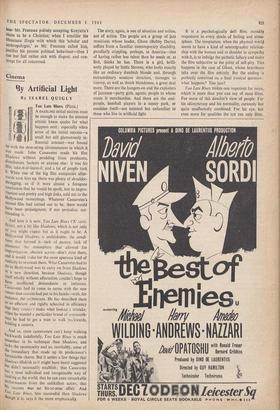Cinema
By Artificial Light
By ISABEL QU1GLY Too Late Blues. (Plaza.) A DAZZLING initial success must be enough to make the stoutest artistic knees quake for what happens next: especially when some of the initial success—a small but still glamorously in- fluential amount—was bound Up with the shoe-string circumstances in which it Was made. John Cassavetes made his film Shadows withbut prodding from producers, distributors, backers or anyone else: it was his film, take-it-or-leave-it, and a lot of people took It. When one of the big film companies after- Wards took him up, there was plenty of shoulder- shrugging, as if it were almost a foregone Conclusion that he would be spoilt, lost to impro- visation and poetry and high jinks, sold out to the Hollywood moneybags. Whatever Cassavetes's second film had turned out to be, there would have been prejudgment, if not prejudice, sur- rounding it.
And here it is now, Too Late Blues CX' certi- ficate), not a bit like Shadows, which is not only as you might expect but as it ought to be. A Hollywood Shadows is unthinkable; the condi- tions that formed it—lack of money, lack of Pressures, the atmosphere that allowed for improvisation, obscure actors—don't exist there, and it would make for the most spurious kind of rusticity to re-create them. What Cassavetes had to (10 in Hollywood was to carry on from Shadows ju a new direction, because Shadows, though itself wholly without affectation, couldn't hope to have unaffected deicendants or imitators. Cassavetes had to come to terms with the new Means that success had put in his hands—with, for instance, the technicians. He has described them as so efficient and rigidly schooled in efficiency that they couldn't make what looked a mistake; When he wanted a particular brand of unsmooth- bess he had to get a man to walk backwards, holding a camera.
And so, since cameramen can't keep walking backwards indefinitely, Too Late Blues is much slnoother in its technique than Shadows, and lacks the spontaneity and so, inevitably, some of the immediacy that made up its predecessor's formidable charm. But it settles a few things that Shadows (flukish as it might have been) suggested hut didn't necessarily establish: that Cassavetes has a most individual and recognisable way of looking at the world, that he can coax remarkable Performances from the unlikeliest actors, that his success was no hit-or-miss affair. And Too Late Blues, less successful than Shadows though it is, says it the more emphatically. The story, again, is one of situation and milieu, not of action. The people are. a group of jazz musicians whose leader, Ghost (Bobby Darin), suffers from a familiar contemporary disability, peculiarly crippling, perhaps, in America—that of having rather less talent than he needs or, at first, thinks he has. There is a girl, brilli- antly played by Stella Stevens, who looks exactly like an ordinary dumbish blonde and, through extraordinary sensitive direction, manages to convey, as well as dumb blondeness, a great deal more. There are the hangers-on and the exploiters of jazzmen—party girls, agents, people to whom music is merchandise. And there are the anti- people, baseball players in a sunny park, or sunshine itself—not inimical but unfamiliar to those who live in artificial light. It is a psychologically deft film; moodily responsive to every shade of feeling and atmo- sphere. The temptation, when the physical world seems to have a kind of seismographic relation- ship with the human and to shudder in sympathy with it, is to indulge the pathetic fallacy and make the film subjective to the point of self-pity. This happens in the case of Ghost, whose heartbeats take over the film entirely. But the ending is perfectly contrived on a final ironical question : what happens? Too late?
Too Late Blues makes one impatient for more, which is more than you can say of most films. For more of this director's view of people. For his idiosyncrasy and his normality, curiously but quite unaffectedly combined. For his eye, but even more for qualities the eye can only filter.






































 Previous page
Previous page